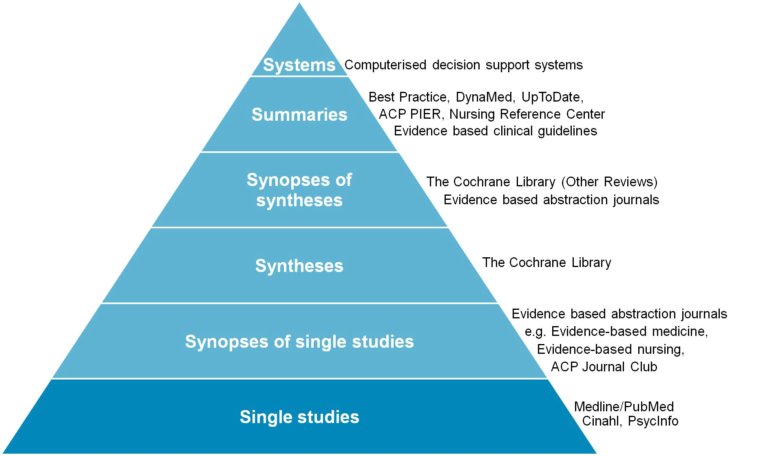Why you shouldn't just 'Google it'
Google is good for finding some information but evidence-based practice requires that you find and use the best available evidence from systematic research. Google will find you lots of information but it doesn't find everything and it won't help you filter the good from the bad.
When looking for answers to clinical questions, you should start with resources containing pre-appraised evidence. The information you find in these have already undergone a filtering and critical appraisal process.
The 6s Model may help you choose the right information resources. The model is explained in these two articles:
DiCenso A, Bayley L, Haynes RB. ACP Journal Club. Editorial: Accessing preappraised evidence: fine-tuning the 5S model into a 6S model. Annals Of Internal Medicine. 151 (6):JC3-2,JC3-3, 2009
DiCenso A, Bayley L, Haynes RB. Accessing pre-appraised evidence: fine-tuning the 5S model into a 6S model. Evidence-based nursing 12(4):99-101, 2009
The below 2 boxes tell you more about the 6s model and which databases to choose when searching for information.

As explained by DiCenso A et al. (see references in the box on the left), you should begin your search at the highest possible level in this model. The type of question you have is also important to consider when choosing information resources. Under the Databases tab you will find a table to help you choose information resources for different types of questions.
The type of clinical question you have indicates what type of research study design you should look for. The below table helps you see which study design is best for a particular question. Articles about different types of research can be found in different databases. In most cases point of care tools such as Best Practice, UpToDate, and DynaMed is where you should start looking. These provide summaries of the research studies. Databases such as EBSCO"s Medline provides abstracts of the research articles that include the Publication (Study) Type. The best level of evidence to answer a clinical question may not always exist
|
Question |
Study Design |
|
Diagnosis |
Cross Sectional Studies |
|
Prognosis |
Cohort Studies |
|
Aetiology |
Randomised Controlled Trials (RCT) Cohort Studies Case Control Studies |
|
Effects |
Randomised Controlled Trials (RCT) Non-Randomised Controlled Trials Cohort Studies Case Control Studies |
|
Experiences |
Qualitative Studies |